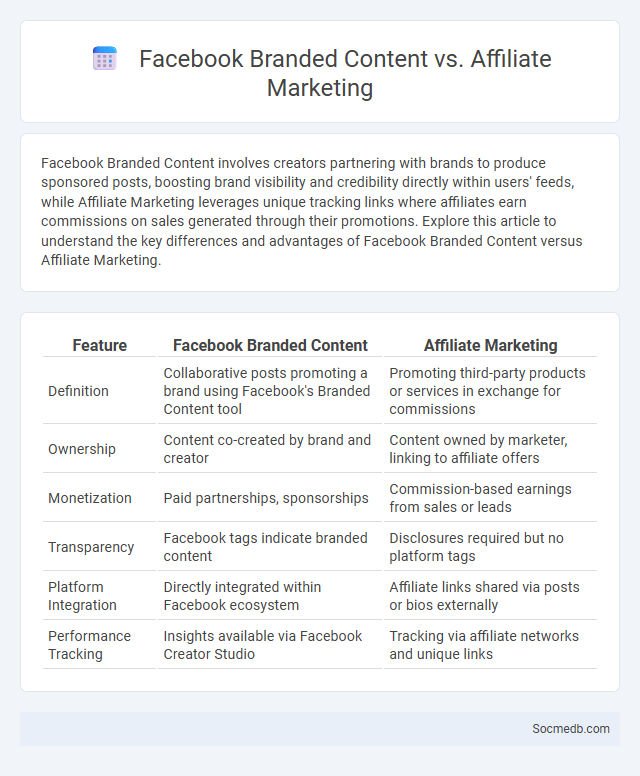
Photo illustration: Facebook Branded Content vs Affiliate Marketing
Facebook Branded Content involves creators partnering with brands to produce sponsored posts, boosting brand visibility and credibility directly within users' feeds, while Affiliate Marketing leverages unique tracking links where affiliates earn commissions on sales generated through their promotions. Explore this article to understand the key differences and advantages of Facebook Branded Content versus Affiliate Marketing.
Table of Comparison
| Feature | Facebook Branded Content | Affiliate Marketing |
|---|---|---|
| Definition | Collaborative posts promoting a brand using Facebook's Branded Content tool | Promoting third-party products or services in exchange for commissions |
| Ownership | Content co-created by brand and creator | Content owned by marketer, linking to affiliate offers |
| Monetization | Paid partnerships, sponsorships | Commission-based earnings from sales or leads |
| Transparency | Facebook tags indicate branded content | Disclosures required but no platform tags |
| Platform Integration | Directly integrated within Facebook ecosystem | Affiliate links shared via posts or bios externally |
| Performance Tracking | Insights available via Facebook Creator Studio | Tracking via affiliate networks and unique links |
Introduction to Facebook Branded Content
Facebook Branded Content enables creators and businesses to collaborate by sharing sponsored posts that highlight products or services authentically. You can leverage this feature to increase engagement and build trust with your audience by transparently promoting partnerships. The platform offers detailed analytics and controls to optimize campaign performance and measure ROI effectively.
What is Affiliate Marketing?
Affiliate marketing is a performance-based strategy where you promote products or services from other companies and earn a commission for each sale or lead generated through your unique referral link. Social media platforms amplify your reach, enabling targeted audience engagement and driving higher conversion rates through content sharing, reviews, and influencer partnerships. Leveraging social media analytics helps optimize campaign performance and maximize your affiliate revenue.
Defining Branded Content
Branded content is a marketing strategy where social media posts, videos, or articles are created to promote a brand's identity while providing valuable or entertaining content to the audience. This approach integrates brand messaging seamlessly without overt advertisements, enhancing user engagement and trust. Your social media campaign can leverage branded content to build authentic connections and increase brand visibility effectively.
Key Differences: Facebook Branded Content vs. Affiliate Marketing
Facebook Branded Content involves collaborations where creators promote a brand's products or services directly within their posts, ensuring transparency through tags and paid partnerships. Affiliate marketing relies on tracking unique referral links or codes, allowing you to earn commissions based on sales generated through your content without explicitly branding the partnership. While branded content emphasizes authentic brand integration and audience trust, affiliate marketing focuses on performance-based revenue through measurable conversions.
Content Creation Strategies for Each Model
Content creation strategies vary significantly between platforms like Instagram, TikTok, and LinkedIn to maximize engagement and reach. Instagram thrives on visually appealing photos and short videos enhanced with trending hashtags and Stories for real-time interaction. TikTok favors authentic, short-form videos using viral sounds and challenges to capture younger audiences, while LinkedIn benefits from professional, in-depth articles, thought leadership posts, and industry-relevant content to build authority and network connections.
Revenue Models: Earning Potential Compared
Social media platforms generate revenue primarily through advertising, subscription services, and in-app purchases, with advertising accounting for the largest share of income. Platforms like Facebook and Instagram excel in targeted ad revenue, while YouTube combines ads with premium memberships and super chats to diversify earnings. Understanding these revenue models helps you identify how each platform maximizes earning potential through user engagement and monetization strategies.
Audience Engagement: Which Method Wins?
Audience engagement on social media thrives through interactive content such as polls, quizzes, and live videos, which foster real-time participation and emotional connection. User-generated content campaigns significantly increase trust and authenticity, leading to higher interaction rates and brand loyalty. Personalized messaging powered by data analytics delivers relevant experiences that drive consistent engagement and conversion.
Platform Policies and Compliance Considerations
Social media platform policies require strict adherence to content guidelines, privacy standards, and intellectual property rights to avoid account suspension or legal penalties. Your compliance strategy should include regular audits of posts, clear user consent mechanisms, and monitoring for policy updates to ensure consistent alignment. Understanding each platform's nuanced rules significantly reduces risks associated with misinformation, harmful content, and data breaches.
Pros and Cons: Facebook Branded Content vs. Affiliate Marketing
Facebook Branded Content allows businesses to create authentic partnerships with influencers, enhancing brand credibility and reaching targeted audiences through personalized storytelling. However, it demands a higher level of creative resources and can limit direct tracking of ROI compared to Affiliate Marketing, which offers measurable performance-based commissions and scalable outreach via multiple affiliate partners. The choice between the two depends on prioritizing brand narrative control and engagement depth (Facebook Branded Content) versus cost-efficiency and precise conversion tracking (Affiliate Marketing).
Choosing the Right Approach for Your Brand
Selecting the optimal social media strategy for your brand involves analyzing target audience demographics, platform-specific content preferences, and engagement metrics. Tailoring content to align with brand identity while leveraging data-driven insights increases visibility and fosters authentic connections. Consistent evaluation and adaptation to emerging trends ensure sustained growth and relevance across platforms like Instagram, TikTok, Facebook, and LinkedIn.
 socmedb.com
socmedb.com